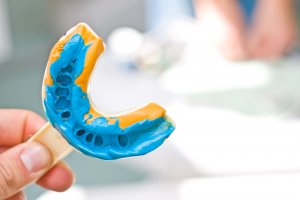A TMJ mouth guard can help ease pain and treat TMJ disorder, but what is it and how does it work? The temporomandibular joint (TMJ) is a hinge-like structure on either side of your jaw that connects your jawbone to your skull. If you have temporomandibular disorder (TMD), you may experience jaw joint pain and problems with jaw movement.
Mouthguards are typically worn at night and there are various kinds you can choose from. Keep reading to find out more about mouthguards for TMJ including:
- Over-the-counter mouthguards
- Custom-made night guards
- Dentist-prescribed mouth guards for TMJ
We hope this information helps you find the relief you need from your TMJ disorder.
What is TMJ?

This is a joint on either side of your jaw that acts like a hinge that connects your jawbone to your skull. TMJ disorder, often just called TMJ, causes pain in the jaw joint and the jaw muscles.
This disorder can be caused by genetics, injuries, or arthritis. In some cases, people who grind their teeth or clench their jaws may also develop TMJ disorder.
While the pain and discomfort caused are no fun, the good news is that it’s typically easy to treat with home care and only requires surgery in extreme cases.
How do you know if you have TMJ?
The only way to be sure if you suffer from TMJ disorder is by visiting the dentist. They can diagnose you, or refer you to a TMJ specialist, who can discuss causes and treatment options with you.
However, you may want to speak with your dentist about TMJ disorder if you experience the following symptoms:
- Jaw pain or tenderness
- Pain in your temporomandibular joints
- Earaches
- Painful chewing
- Facial aches
- Jaw locking, clicking, or grating
- Limited jaw movement
Do mouthguards help TMJ?
If you have TMJ, your dentist will most likely recommend some lifestyle changes, including wearing a mouthguard, eating softer foods, icing the joint to reduce inflammation, and taking pain meds. Surgery is only recommended in very extreme cases.

Your dentist may recommend a mouth guard for TMJ
Mouthguards for TMJ are a treatment method that your dentist may prescribe to help because a mouthguard can ease some of the most irritating TMJ symptoms.
That’s because mouth guards, or night guards, can help you stop grinding your teeth or clenching your jaw when you sleep, which will ease a lot of the pain you experience. Some mouth guards are specially designed to stabilize your teeth, or even reposition your jaw by making your muscles relax, although this type should only be used if prescribed by a dentist.
Types of night guards for TMJ
There are many different types of mouthguards on the market, including hard and soft night guards, some of which will be more useful when it comes to treating TMJ.
Over-the-counter mouthguard for TMJ
These are mouthguards that you can buy online or at a pharmacy, and they typically aren’t the best solution. There are three main types of OTC night guards for TMJ:
- Adjustable: These are made of a material that becomes flexible when placed in warm water. This means that you can readjust them as needed.
- Boil-and-bite: These mouthguards are boiled in hot water, and then you set them by biting down and letting them cool and form around your teeth. Once they have cooled, they are no longer moldable.
- One-size-fits-all: This is the cheapest and arguably least effective mouthguard you can buy. They can’t be adjusted, so if you purchase one, you’ll just have to hope that it’s a good fit. If you feel pain after wearing this mouth guard, you should stop using it immediately.
Custom bite guard for TMJ

Night guards that are custom-made generally work much better to ease the symptoms of TMJ and other problems like tooth grinding and bruxism because they are tailored to your specific teeth and mouth.
These can be ordered online for convenience. Typically, you first order an impression kit so you can make moulds of your teeth at home.
You then send the moulds back to the company, and they’ll have your custom TMJ guard made in a dental lab. Once they send them back to you, you can start wearing them to ease TMJ.
These companies will also keep the moulds of your teeth on file so that if you need to order a replacement mouth guard you don’t have to retake your tooth impressions.
Prescription mouth guards for TMJ
If you go to the dentist with a more severe case of TMJ, they might prescribe you a mouth guard depending on the conditions and symptoms you have. There are two main types of mouth guards from the dentist for TMJ:
- Stabilization splints: These mouth guards cover all of your teeth and are designed to prevent clenching and bruxism. They can be either soft or hard, depending on your needs, and ease TMJ pain by helping jaw muscles to stop overextending or overworking.
- Repositioning splints: These guards actually pull your lower jaw forward, and may need to be worn all day and all night initially. Once your TMJ pain begins to go away, your dentist will come up with a treatment plan for long-term use, that most likely will not require wear throughout the day.
Conclusion
TMJ disorder can cause pain and discomfort in your jaw and face and should be addressed so that it doesn’t get worse. This is a treatable condition that your dentist can help you handle with care at home.
One of the aspects of treatment is often wearing a mouth guard to help stop the pain from tooth grinding and to help your TMJ from getting worse.
You can purchase a mouth guard over the counter, you can order custom mouth guards online, or, in more severe cases, you may need to get a prescription mouthguard from the dentist.
You’ll see a different range of mouthguard costs, depending on the kind you get, and you should always make sure to take good care of your mouthguard to prevent bacteria build-up and to make them last longer.
FAQs
How long does it take for a mouth guard to work for TMJ?
It is possible to feel relief from symptoms as soon as the first night after wearing a bite guard for TMJ. However, for some, it may take a few nights or even a couple of weeks.
NHS. Temporomandibular disorder (TMD). Consulted 1st June 2022.




